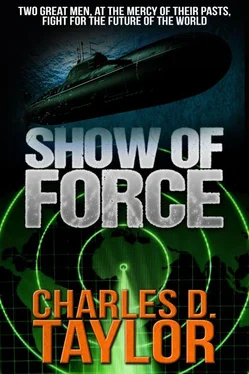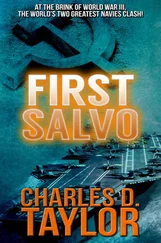She assumed he must be quite drunk at his own party, and she made a point of not smiling. The new Lieutenant Commander Charles was having a good time, but he was not too drunk to look twice at the pretty girl he was introduced to. She was quite tall for a woman, probably only two inches shorter than he was, but he reasoned that he was fairly short for a man. Her figure was obviously full, even with the conservative clothes she still chose to wear, and her high cheekbones and green eyes were set off by long dark hair.
David decided she would be even more attractive when she smiled. Having had enough to drink to remember old jokes that could be told in front of women, he finally made her laugh and found that he was absolutely right. Her green eyes sparkled when she decided he wasn't so bad after all, and crinkled around the edges, staying that way even after she had stopped laughing. She accepted' the drink she had at first refused. She also found his conversation interesting, even when she realized he had adeptly sidestepped her polite questions about him and had her talking about her own Midwestern background. Maria stayed until the party broke up and then accepted a ride home.
David Charles called her the next day and asked her to dinner, and that was the beginning of her new life. In less than a month, even before he was scheduled to arrive in Monterey, he had asked her to marry him. After arguments with herself about propriety and another Navy husband, she agreed, and the Navy allowed him to take an extra few days for a honeymoon. They had both begun a new life that neither had been looking for.
FROM THE LOG OF ADMIRAL DAVID CHARLES
I think I know exactly when I decided that my life would be the Navy. It was when we realized those bastards were hiding over the border and using Cambodia as a staging area for killing Americans. I never thought much of the war one way or the other and kind of thought that we were wasting our time in Vietnam, but as long as there was an American being shot at, I always thought we ought to stand up for ourselves. When I decided to send those planes in, I made a commitment to myself to stay in the service. Perhaps I decided there has to be someone around to make up their mind when American servicemen are being killed. I have no doubt our government is going to get me and a lot of others in the same position again, and I want to be sure someone like me is going to be there to protect the troops. That sure looks a bit foolish on paper, but I had to get it down so I'd know why when I start asking myself what the hell I'm doing in the Navy six months or six years or sixteen years from now.
If I had the guts, I'd fly back to Washington right now to talk this over with Sam Carter. But he might say I'm wrong, and I'm not ready for that yet. He is a strong believer in maintaining the separation between the civilian and the military, regardless of the way the politicians keep committing lives without giving the poor grunt the opportunity of all the protection the country has to offer. There's a question of objectivity there that Sam and I could argue about, but perhaps all my ideas aren't ready to be punctured quite yet.
I won't make myself available for any combat assignments again for a long time. Not only was Mundy right about taking such chances, but now that I have Maria, there is suddenly more to live for than I ever imagined. And she's taught me so much, beyond just how to love. Perhaps it was some of the things she's said to me that made me come to the decision I mentioned above. She told how she stood out on the rocks near the Cliff House the day Enterprise left for Vietnam. She watched the ship pass under the Golden Gate, her deck empty except for the plane-guard helicopters. Then she heard, before she actually saw, the Phantoms passing low overhead, only moments after their takeoff from Alameda. They swept ahead of their carrier in formation, then circled as Enterprise turned into the wind to take the air group aboard. She thought one of them had tipped its wings, as he always said he would whenever they went to sea, but she was never sure. She told me how hard she cried, so hard she couldn't drive home for more than an hour afterward. Somehow, she knew he wouldn't come back.
What hurt her the most after he was shot down was his attitude, that he always felt he'd get through, that it would be the other guy who wouldn't bail out. I think that's why I've changed my attitude about my own survival. The other reason is simply that she wouldn't agree to marry me at first if I stayed in the Navy, and then she relented when Sam promised her he'd always be looking over my orders to make sure I stayed out of trouble. I think perhaps the fact that the Navy made it quite clear that they wanted me to keep a low profile for quite a while helped change her mind. Now, I have a responsibility other than myself.
The other thing that Sam and I did discuss again before he went back to Washington was his old concept of power. Since that first time he talked about it, I've done a lot of reading and a lot of thinking. Use of power and abuse of power are hard to differentiate sometimes. And power doesn't always have to come from sheer might. The VC proved that to me. Power can be ninety percent in your head, and I suppose that goes right back again to the German General Staff. The VC used their heads to take advantage of their land and our American egos. When that happens, you can create the biggest bang in the world, but you're not going to impress anyone other than yourself if the enemy is simply waiting for the smoke to clear so they can get back to the business at hand. That's what they always did, whether they were slipping into camp on a hit and run, disappearing during the day, or hiding on the other side of the border. And they made more use of American stupidity than anything else. The concept that you allow your enemy to shoot at you and then let them cross an imaginary line where you don't go after them is the dumbest idea any civilian ever thought up, and I think even Sam agrees with that. The politicians constantly let us beat ourselves. Clauswitz spent a lot of time writing about that, so I guess that proves wars don't change much in a hundred years, even if the weapons do.
I need this time at school. Monterey is a lovely place. I'm married and happier than I've ever been before. I have time now to learn more about myself and maybe grow up a little bit. No more of the American warrior for a while. I'd much rather be a professional military man in the intellectual sense. Perhaps if there are enough of us, we can keep the civilians away from wars. Maybe what bothered me more than anything else over there was that while I was practicing being good at my job, a lot of people were dying to satisfy politicians' egos and academics' theories.
The sailor on the small flight deck raised his arms to signify over the noise that all was clear. A helicopter lifted slowly from the deck, rotors cutting the air with a whistling sound to compete with the roar of the engines as California moved away from under it. Then, obviously clear, it hurtled rapidly upward before swinging out and away from the ship. Already another of the choppers had appeared, hovering behind the ship, waiting its turn to land and retrieve more of David Charles's staff for their transfer to Nimitz. Inside the cabin of the first helicopter it was much quieter, enough so that the occupants could hear themselves talk.
"When we're about halfway there, have him take her up to five thousand feet," said David. "I'd like to take a look at the others," He was referring to the additional ships that had joined Nimitz and her escorts moving northward after her feint toward South Africa. Knowing that the Russians followed each move of the U.S. carriers, he had sent Nimitz on a supposed visit to Capetown as soon as he had been made aware of the situation surrounding Islas Piedras. He hadn't actually expected Gorenko to believe he would permanently shift his flag to a cruiser and send his airpower off to spread goodwill at a time like that, but he wanted to keep them guessing. The Russians were almost paranoid about American movements that did not fit into their way of doing things.
Читать дальше












